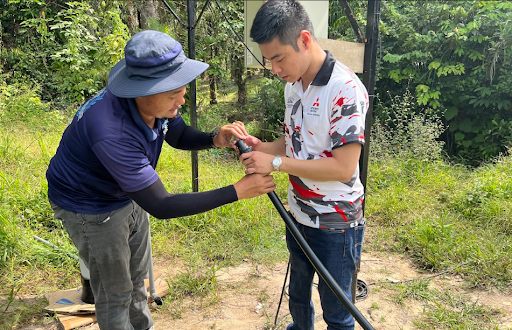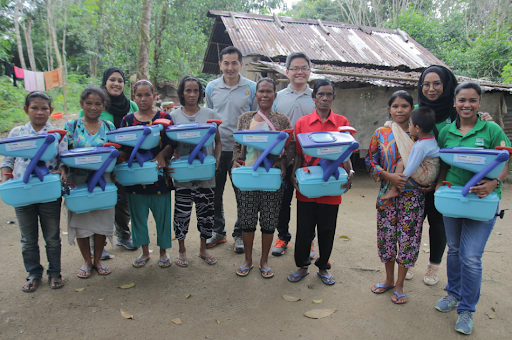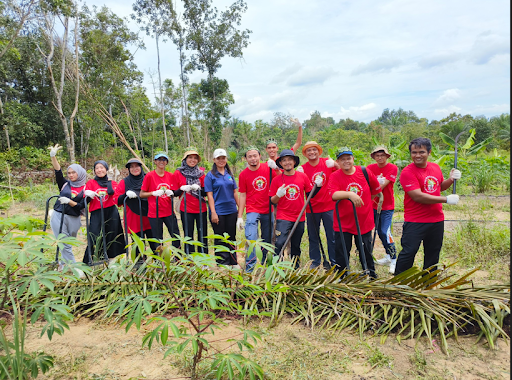
Corporate Social Responsibility (CSR) plays a crucial role in empowering Orang Asli communities for sustainable development. These initiatives can focus on basic needs, education, healthcare and economic opportunities, all while ensuring respect for the communities’ cultural heritage and traditions. By partnering with local organizations, corporations can create tailored programs that foster community resilience and ownership.
CSR efforts also facilitate capacity-building initiatives, equipping Orang Asli with skills for self-sufficiency and sustainable livelihoods. Training programs in sustainable farming and poultry farming provide Orang Asli communities with the skills to become self-sufficient, helping reduce their reliance on external aid and supporting long term sustainability. Companies can advocate for policies that protect their rights and preserve their land by engaging with policymakers and promoting fair regulations. This advocacy fosters collaboration with local communities, ensuring their voices are heard and contributing to a more inclusive society.
Through CSR initiatives, companies can raise awareness of the challenges faced by Orang Asli communities, including land rights. By educating the public, stakeholders, and even policymakers about the importance of protecting these communities’ rights and preserving their land, CSR activities can create wider support for relevant policy changes.
What are Corporate Social Responsibility activities?
Corporate Social Responsibility (CSR) refers to voluntary actions taken by businesses to be a socially responsible company to their stakeholders and to society. Companies that practice CSR can also ensure that their businesses act ethically and competitively. CSR can also involve various activities that will benefit society in terms of economic responsibility development and also ensure that the environment is preserved.
Growing Expectations for CSR
In recent years, the emphasis on Corporate Social Responsibility (CSR) has surged significantly among consumers, investors, and employees. Here are some key statistics that highlight this growing interest and its impact on business practices:
Customer Perspectives on CSR
- Importance of Purpose: 70% of Americans believe it’s either “somewhat” or “very important” for companies to make the world a better place, compared to just 37% who prioritize profit for shareholders.
- Purchasing Motivation: 77% of consumers are motivated to purchase from companies committed to positive societal impacts.
- Zero Tolerance for Unethical Practices: 25% of consumers have a “zero tolerance” policy towards companies that engage in questionable ethical practices.
- Expectation to Take a Stand: A majority (55%) of American consumers think it’s important for companies to take a stand on key social, environmental, and political issues.
Investor Perspectives on CSR
- Investment Impact: 73% of investors state that efforts to improve the environment and society influence their investment decisions.
- Engagement with CSR Practices: 41% of millennial investors are significantly engaged in understanding a company’s CSR practices, compared to 27% of Gen X and 16% of baby boomers.
Business Growth Linked to CSR
- Growth Correlation: 48% of organizations with a strong sense of purpose experienced 10% or more growth in the last three years, indicating a direct correlation between purpose-driven strategies and financial performance.
- Executive Awareness: Nearly 90% of executives believe that a strong collective purpose within their organization enhances employee satisfaction and customer loyalty, which can lead to improved business outcomes.
These statistics illustrate the increasing expectation from consumers and investors for companies to engage in CSR initiatives. This trend underscores the importance of addressing social issues, such as supporting marginalized communities like the Orang Asli in Malaysia, through effective CSR strategies that promote sustainable development and empower vulnerable groups.
What are the benefits of CSR in Malaysia?
Corporate Social Responsibility (CSR) initiatives are particularly beneficial for supporting marginalized communities, like the Orang Asli.
These initiatives could focus on basic needs, education, healthcare and economic empowerment, collaborating with local NGOs, the private sector, foundations, and even government agencies.
Benefits of implementing CSR activities
Corporate Social Responsibility (CSR) Benefits
- Enhances company reputation, customer loyalty, and employee morale.
- Attracts consumers’ value for socially impactful brands.
- Creates a positive work environment, increasing employee satisfaction and retention.
- Integrates into business practices for societal well-being, long-term success, and competitiveness.
6 CSR activities examples
- Environmental sustainability: This includes actions like reducing carbon footprints, implementing recycling programs, using renewable energy sources, and engaging in reforestation efforts.
- Philanthropic giving: This involves donating funds, products, or services to charitable organizations and non-profit causes.
- Ethical labour practices: This encompasses ensuring fair wages, safe working conditions, and respect for human rights throughout the company’s supply chain.
- Community volunteering: This involves organizing employee volunteer programs to support local community initiatives, such as participating in clean-up drives or helping at food banks.
- Diversity, Equity, and Inclusion (DE&I): This includes implementing policies and programs that promote diversity in the workplace, ensure equal opportunities for all employees, and create an inclusive work environment.
- Ethical sourcing and fair trade: This includes actions that ensure that the products that a company uses are sourced in an ethical manner, and that the people who produced the products are paid a fair wage.
Key CSR Initiatives by Global Peace supporting Orang Asli Development
Clean Water and Sanitation

Mitsubishi volunteer supporting the installation of pipes for the solar water pump (SWP) at Bukit Serok Lama village
The Water, Sanitation, and Hygiene (WaSH) Project is a key element in ensuring the sustainability of Orang Asli livelihoods and improving environmental responsibility. It is also dedicated to increasing access to clean water and promoting good hygiene practices in communities that do not have enough water services.
The project is implemented with an effective and sustainable water filtration system. The system is designed to purify water from local sources, making it safe for drinking and daily use. Not only that, getting solar-powered water pumps that are easy to maintain in the village is also part of the effort to harness renewable energy to operate efficiently. All these innovative approaches not only make water more accessible, but also encourage consistent use, which ultimately leads to better health outcomes.


Nestlé team (in Green) visiting Kampung in 2018, providing water filters as part of their CSR initiative
The WaSH project also aims to increase access to clean water and sanitation facilities by helping villagers build stalls and latrines. The initiative provides safe personal sanitation options, especially for women and girls. It reduces the spread of disease and empowers individuals to take ownership of hygiene and sanitation practices, ultimately fostering healthier and more resilient communities.
Access to education for Orang Asli children in small villagers
The initiative focuses on holistic development, improving literacy, numeracy, social skills and culture awareness. It equips young individuals with social skills and nurtures their talents. The approach integrates life skills development, fostering empathy, communication, and collaboration. It introduces students to STEM activities, sparking curiosity and innovation. The goal is to cultivate lifelong learners who are academically proficient, socially responsible, and adaptable.
The Mobile School and Forest School initiative is a program that aims to provide accessible and inclusive education by bringing resources directly to communities. It emphasizes strong family-school partnerships and collaboration between parents and educators to create a supportive learning environment. This initiative aims to bridge gaps and ensure all children have the opportunity to learn to a higher standard.
Empowerment & Leadership Camps for Orang Asli Youth
The empowerment and leadership camp is a significant initiative designed to nurture and develop leadership skills among underprivileged youth. The camp helps young individuals explore their potential, build self-confidence, and learn the skills essential for effective leadership. Through a combination of workshops, team-building activities, and mentoring opportunities, participants are encouraged to step out of their comfort zones and embrace challenges that foster personal growth.
The camp serves as a platform for networking and connection, allowing underprivileged youth to engage with peers and mentors from diverse backgrounds. By fostering relationships and encouraging collaboration, it creates a sense of belonging and community among participants. By investing in the leadership potential of these young individuals, the camp is able to contribute to the development of future leaders who can drive social change and inspire others in their communities.
Sustainable Livelihoods
The aim of this initiative is to encourage Orang Asli community to practice sustainable agriculture and also raise poultry as one of their sources of livelihood. The initiative involves raising chickens that provide a source of protein as well as agricultural crops such as cassava, corn, durian, and chilli.

Ninja Van volunteers all smiles behind the A-line plot they mulched
To make this initiative a success, the CSR Programme is essential in providing training facilities and direct support for education on sustainable agricultural methods. This in turn equips farmers with the skills and knowledge they need to thrive. Furthermore, focusing on regenerative practices, such as syntropic agriculture, also helps restore soil fertility to ensure the community produces a continuous source of food.
Collaboration with local organisations and experts further strengthens this initiative, fostering a network of support that enables Orang Asli community to gain knowledge related to agriculture. Through this effort, the CSR project is taking a major step towards building resilient, self-sufficient communities that can thrive sustainably.

Enquest volunteers installing the Solar Sun King
Renewable energy initiatives play a vital role in ethical responsibility to transforming the lives of communities in remote areas, especially through the provision of solar panels. The importance of solar energy is to provide good lighting to help students complete their academic work. With light, students can study after sunset and increase access to education to increase literacy rates and academic performance, which ultimately pave the way for a brighter future.
In addition to supporting education, solar panels also facilitate a variety of night-time activities that contribute to community development. Families can gather for social events, and engage in productive activities during the night. By harnessing renewable energy, this initiative not only reduces dependence on traditional energy sources, but also benefits the environment.
Collaboration with NGOs & Local Communities
Collaboration with NGOs that prioritize philanthropic responsibility is essential for ensuring that Corporate Social Responsibility (CSR) initiatives effectively address the unique needs of local communities. By partnering with organizations that have a deep understanding of the local context, companies can tailor their initiatives to align with the specific challenges and priorities faced by the community. This strategic approach not only enhances the relevance and impact of CSR program but also fosters trust and rapport between corporations and local residents. NGOs often serve as vital bridges, facilitating communication and collaboration that lead to more sustainable and effective development outcomes.
Furthermore, engaging with local communities in the planning and implementation of CSR initiatives promotes a sense of ownership and empowerment among residents. When community members are actively involved in the process, they are more likely to contribute their insights, ensuring that the initiatives are culturally appropriate and beneficial. This collaborative model not only supports sustainable development but also strengthens community resilience, as local stakeholders become champions of the initiatives. Ultimately, such partnerships drive meaningful change, creating a positive cycle of growth and development that benefits both the community and the organizations involved.
Challenges in Implementing CSR
Implementing CSR Initiatives Can Be Difficult
- Logistical complexity, especially in remote or underserved areas.
- Timely resource delivery, coordination with local stakeholders, and efficient supply chains.
- Delays in project implementation and potential hindrance of community-benefit initiatives.
CSR Success Factors
- Cultural sensitivity: Organizations must respect and understand local cultural norms and values to avoid misunderstandings and resistance.
- Financial barriers: Securing adequate funding or budget constraints can limit the scope and sustainability of CSR projects.
- Overcoming challenges: Thorough planning, strong partnerships with local communities and NGOs, and adaptability to unique needs and circumstances.
Why should a company adopt CSR strategies?
Corporate Social Responsibility (CSR) Strategies
Enhances company reputation and customer loyalty.
- Attracts and retains customers through ethical standards, environmental sustainability, and community support.
- Builds trust, fosters loyalty, encourages repeat purchases, and boosts referrals.
CSR Strategy Importance
- Promotes sustainability and fosters positive stakeholder relationships.
- Improves operational efficiency, reduces risks, and enhances innovation.
- Fosters supportive network with employees, customers, suppliers, and community.
- Positions a company for lasting success in a competitive marketplace.
The Impact of CSR
Corporate Social Responsibility (CSR) has a profound impact on both businesses and society, serving as a catalyst for boosting reputation, building customer loyalty, and driving long-term success. By engaging in socially responsible business practices, companies can enhance their brand image and differentiate themselves in a competitive marketplace. Consumers are increasingly drawn to brands that demonstrate ethical behaviour and a commitment to sustainability, leading to stronger customer loyalty and trust. This positive relationship not only results in increased sales but also fosters a resilient business model that can adapt to changing market dynamics while benefiting society and the environment.
Additionally, CSR plays a critical role in empowering vulnerable local and global communities, addressing socially responsible inequalities, and fostering inclusive development. Through targeted initiatives such as education, healthcare, and economic support, companies can uplift marginalized groups and contribute to community well-being. By investing in the social fabric of these communities, businesses not only help to alleviate poverty and enhance quality of life but also pursue environmental stewardship for their operations.
Businesses are encouraged to embrace Corporate Social Responsibility (CSR) in collaboration with the Global Peace Foundation Malaysia to drive growth and foster positive impact change. By partnering on impactful initiatives, companies can contribute to social cohesion, sustainable development, and community empowerment, all while enhancing their brand reputation. Together, we can create a more peaceful and prosperous future for all.
Join Us Now to increase CSR efforts
“Every ringgit spent on CSR projects is an investment in clean water, climate stability, and cultural preservation.”






